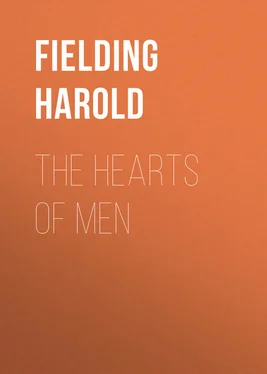Harold Fielding - The Hearts of Men
Здесь есть возможность читать онлайн «Harold Fielding - The Hearts of Men» — ознакомительный отрывок электронной книги совершенно бесплатно, а после прочтения отрывка купить полную версию. В некоторых случаях можно слушать аудио, скачать через торрент в формате fb2 и присутствует краткое содержание. Жанр: foreign_antique, foreign_prose, на английском языке. Описание произведения, (предисловие) а так же отзывы посетителей доступны на портале библиотеки ЛибКат.
- Название:The Hearts of Men
- Автор:
- Жанр:
- Год:неизвестен
- ISBN:нет данных
- Рейтинг книги:3 / 5. Голосов: 1
-
Избранное:Добавить в избранное
- Отзывы:
-
Ваша оценка:
- 60
- 1
- 2
- 3
- 4
- 5
The Hearts of Men: краткое содержание, описание и аннотация
Предлагаем к чтению аннотацию, описание, краткое содержание или предисловие (зависит от того, что написал сам автор книги «The Hearts of Men»). Если вы не нашли необходимую информацию о книге — напишите в комментариях, мы постараемся отыскать её.
The Hearts of Men — читать онлайн ознакомительный отрывок
Ниже представлен текст книги, разбитый по страницам. Система сохранения места последней прочитанной страницы, позволяет с удобством читать онлайн бесплатно книгу «The Hearts of Men», без необходимости каждый раз заново искать на чём Вы остановились. Поставьте закладку, и сможете в любой момент перейти на страницу, на которой закончили чтение.
Интервал:
Закладка:
The teaching of Christ? His example? You do not understand that? Was not His life the perfect life, His teaching the perfect teaching? You say that this teaching cannot be followed now in its entirety. Is it not the wickedness of man that prevents it? Did each man act up to this teaching, to this example, would it not be a perfect world? Let each man try his best and the world will improve. Such as I have written were the answers he found to his questions. I do not say that these are always the answers that are given. It may be there are others. It may be that in the years that have passed since then new explanations have been evolved.
Although I do not think that is so, as only a year ago I saw some of these very replies written in a well-known Review as the authoritative answer of scientific theology to these difficulties. However that may be, these are the answers the boy received, such were the guides given to lead him out of the darkness of scepticism into the light of faith.
CHAPTER V
SCIENTIFIC THEOLOGY – II
What thought the boy of these explanations? Do you think they helped him at all? Do you think he was able to accept them as real? Did they throw any light into the darkness of his doubts?
The boy took them and considered them. He considered them fairly, I am sure; he would have accepted them if he could. For what he was looking for was simply guidance and light. He had no desire for aught but this. If he revolted now from the faith of his people it was because he found there neither teaching he could accept nor help. If the scientific theologian shewed him that the error was in him and not in the faith the boy would, I think, have been glad. So he took these explanations and considered them, and this is what he thought.
They tell me that the seven days of creation are seven epochs. I did not ask that. To my question whether man has fallen, as the Bible says, or risen, as science declares, no reply has been given.
There is only a specious likening of a man's life, saying that man falls from the innocence of his childhood to sin through the knowledge of evil, and requires redemption. My question is avoided, and a new sophism given me which is also untrue. A child is not innocent. It is only ignorant and weak. Its natural impulses are those of a savage. It requires to learn the knowledge of good and evil to subdue these instincts. This symbolism of the child is utterly false. A child is to us a very beautiful thing because its tenderness, its helplessness, its clinging affection awaken in us feelings of love, of protection, which we feel are beautiful. All men should, all men I think do, love children, but the beauty is in the man's emotions that are awakened, not in those qualities of the children that awaken them.
To go beyond this and say that a child should be a model to man is to display ignorance of what children are, to mistake effect for cause, to exalt childishness into a virtue. Theologians use this argument, which is merely a play upon our affection for children, to try and induce us to accept their theology with the same ignorant confidence that a child accepts all it is told by its parents. It would suit theologians for all men to be babes in this sense, in their senselessness. But if theology will bear the light of reason, why ask us to accept it blindly? Why? Is it because it will not bear scrutiny?
And surely of all the answers, this answer about the character of God is the most extraordinary. "God is not really unjust or partial, or revengeful. That is merely the impression His acts make on us." Truly here is an argument. How can anyone, even God, be judged except in His acts? If His acts are revengeful, is not He revengeful? "No!" says the theological scientist, "that is merely your ignorance. Events make a wrong impression on you."
How, then, am I to judge which are wrong and which are right impressions? God acts, as it seems to me, angrily; He is not angry. On other occasions He acts, as it seems, mercifully. How am I to know that this impression of mercy is not an error? How, in fact, am I to know that anything exists at all? If God's anger and partiality and changeableness are merely impressions of my mind, are not all His attributes merely impressions also, and do not exist? In fact, is not God Himself merely an impression and He does not exist? Where are you going to stop? The theologian will doubtless say, "When I tell you." But then he is unfortunately arrogating to himself an authority which does not exist, an authority to twist and turn the Bible to suit his own sophisms, an authority to bind your mind which no one has given him. Impressions forsooth. What impressions can any candid mind have of the scientific theologian? And when the boy read the explanation of the difference between the all-presence of God and the all-presence of Satan, I am afraid he laughed.
But prayer is a serious matter. No one can feel anything but sorrow to see the explanation of God and prayer. The theological scientist again repeats the Bible words and has his own explanation. No, God is not moved by prayer. This is merely another wrong impression of ours, an impression taken from the Bible words. The action of prayer is not objective, but subjective; its effect is not on God, but on you.
Now mark what he has led himself into. Prayer will purify a man. To ask God for what he wants won't make the slightest difference in God's acts, but will in your own feelings. Nevertheless, as of course no one would or could pray unless he hoped to be answered, man must be told that God does listen. But this is not true. Therefore, according to theological science, the Bible directly tells us a falsehood in order to lead us into a good action. Is there any escape from this? There is none. The whole meaning and reason of prayer is that God does listen, that He does forgive if asked, that He does help us and save us. Unless a man held this belief firmly he would not pray. Try and you will see. Imagine to yourself, as the theologian declares, that God is quite unmoved by prayer, and that the action of prayer is subjective, and see if you can get up any prayer at all. It is impossible. How much fervency will there be in a request you know will not be granted or attended to? How much subjective action will follow that prayer? The subjective action is absolutely dependent on your belief that God does listen and is influenced by your prayer. But the scientific theologian says your premise is false.
Can you imagine this theologian's prayer? Can you see him kneeling and uttering supplications to a god whom he knows he cannot affect or influence, and pausing now and then to see how the subjective effect on himself was getting on? But it is not even a subject to be bitter over, only to be sad. Truly, if I wanted to make a man an atheist and a scoffer, a railer at all religion, at all religious emotions, at all that is best in our natures, I would take him to a scientific theologian and have him taught the scientific theological theory of prayer.
And again, though the boy understood how a man could be the son of his father, the husband of his wife, the father of his son, three different relations to three people, it did not help him to understand how he could be so to one person. A man cannot be his own son and his own father, and have proceeding from him a third person different and yet the same. The argument seemed to him childish.
As to the teaching of Christ, of what use is a teaching that is suitable only to an ideal state of things? Is it any use to me to tell me that if everyone agreed at once to follow this teaching the world would be perfect? Even if this were true, what would be the use? The world never has accepted it and does not do so now. No one does except a few people who are called visionaries or fanatics. Even the Quakers only accept a part, and it is well for them that their fellow citizens do not accept even that part, or these Quakers would soon be robbed of their wealth. A nation of Quakers would be a nation of slaves. All this talk of what would happen if at a given signal all the world became perfect is useless dream talk. I want realities. This code of Christ is not a reality. No quicker way of destroying civilization and all that it means could be desired than by attempting to follow it. We must be ready and prepared to fight other nations, we must have armies and navies, and we must honour them. We must have magistrates, and police, and prisons, and gallows.
Читать дальшеИнтервал:
Закладка:
Похожие книги на «The Hearts of Men»
Представляем Вашему вниманию похожие книги на «The Hearts of Men» списком для выбора. Мы отобрали схожую по названию и смыслу литературу в надежде предоставить читателям больше вариантов отыскать новые, интересные, ещё непрочитанные произведения.
Обсуждение, отзывы о книге «The Hearts of Men» и просто собственные мнения читателей. Оставьте ваши комментарии, напишите, что Вы думаете о произведении, его смысле или главных героях. Укажите что конкретно понравилось, а что нет, и почему Вы так считаете.












